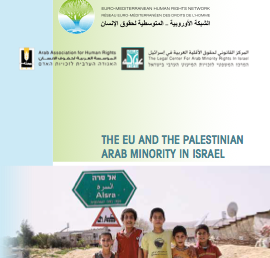Adalah, Al Tufula Center and Kvinna till Kvinna call on EU and EU Member States to ensure that Palestinian Women’s Rights are being considered and protected
The organizations present new EMHRN report: Palestinian Women’s Rights in EU-Israel and EU-PA Relations before 20 diplomats in Tel Aviv
participated in focus group sessions to conceptualize the content of this report.
The NGOs called on the EU and EU member states to urge Israel and the PA, respectively, to ensure equality for Palestinian women in various fields including education, employment and health, and to combat domestic violence. The NGOs also demanded accountability and called on the EU to urge Israel to cancel the Citizenship Law, which prevents the unification of Palestinian families in Israel. The NGOs stressed that the EU should urge Israel to cease all human rights violations concerning land confiscation, house demolitions, and forced displacement, which affects particularly affects families and Palestinian women. The organizations urged the EU and EU member states to demand that Israel fulfill its commitments and implement the concluding observations of the UN Committee on the Elimination of Discrimination Against Women (CEDAW); and for the EU to adopt affirmative action measures for Palestinian women and to afford grants to them to study at European universities, and to enhance their participation in European community programmes.
Ms. Nabila Espanioly, the director of Al Tufula Center, addressed some of the most vital issues facing Palestinian women, citizens of Israel. Espanioly stressed the high unemployment rate, the lack of employment opportunities, and the lack child care centers subsidized by the government, as there are only 51 centers in Arab towns out of 1,621 centers in Israel (only 3.4%). Espanioly also discussed the issue of education for women stating that too many girls drop out of school, especially towards their high school years and there is a serious lack of qualified staff to address this issue. She also addressed the discrimination against women in regards to health issues, especially in the unrecognized villages, where there is a serious lack of health care facilities and few doctors.
Adalah Attorney Sawsan Zaher in turn addressed Israeli violations of Palestinian women’s rights in the Occupied Palestinian Territory. Zaher emphasized that the restrictions imposed by the Separation Wall and the 500+ checkpoints in the West Bank have a greater impact on women and impose a greater risk, particularly on pregnant women, students and workers, which leads to the denial of their rights to health, education and employment. Zaher added that the increase in Israeli military violence on the Palestinians in the West Bank and Gaza have a significant impact on Palestinian women. For example, home demolitions have an impact on Palestinian society in general, but have a much greater effect on Palestinian women because it is in accordance with the prevailing social standards by which homes and families are the responsibility of women and therefore the impact of the demolitions cause greater distress on women.
Questions from the participants included issues concerning employment, national service/military service, the low participation of Palestinian women in politics, and the role of Palestinian women in the peace talks.
Rina Rosenberg (Jabareen), Adalah’s International Advocacy Director, chaired the panel and introduced the EMHRN and provided a background to the report. Magnea Marinosdottir, the Country Director of Kvinna till Kvinna, presented the organization, its role in Israel/OPT with Palestinian women’s rights organizations, and its role in the EMHRN. Jana Boulos from Adalah and Rana Al-Arja Khoury of Kvinna till Kvinna also participated in the meeting.
For more information:
Read full report here (English, Arabic)
See EMHRN Press Release, Palestinian Women in the face of Double Discrimination, 9 March 2014













